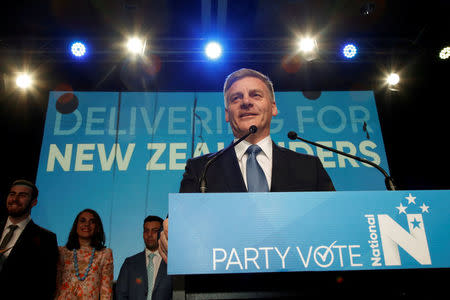New Zealand parties hold talks to form government after final vote tally
By Ana Nicolaci da Costa WELLINGTON (Reuters) - New Zealand's major political parties will be meeting on Sunday, with the small nationalist party that holds the balance of power after the Sept. 23 election expected to hold talks about the formation of the next government. The New Zealand First party will meet with the ruling National Party, led by Prime Minister Bill English, at midday and then in the afternoon with the Labour Party, led by Jacinda Ardern who almost single-handedly boosted her party's chances after assuming the party's leadership in August. Winston Peters, the leader of the New Zealand First Party, has kept his cards close to his chest but told local media on Saturday that the release of the final vote count would put them in a better position to make decisions. The final tally, which included overseas voters and those who voted outside their home constituencies, showed National lost some ground to the Labour-Green bloc, even though it still held the largest number of seats in parliament. Analysts expected the New Zealand dollar to show little reaction to the final results, given that the "special votes" had been widely expected to favour the left-leaning parties based on previous elections. "I think on Monday the market is going to be a little bit subdued because basically nothing has changed," said Stuart Ive, private client manager at OM Financial. "You could say that the policies are probably more aligned to a Labour-Green-NZ First partnership but a three-way coalition is a lot harder to manage than a two-way coalition." National won 56 seats in parliament, losing two seats to the Labour-Green bloc which together took 54 seats. Both were short of the 61 needed for a majority, and were left reliant on New Zealand First's nine seats to form a coalition. The narrowing in the gap between the two sides could make Peters more comfortable to go with Labour-Greens if he so chooses. NEGOTIATIONS Prime Minister Bill English said on Saturday negotiations would now likely focus on the economy. Both Labour and New Zealand First have said they want to curb immigration, renegotiate certain trade deals and adjust the role of the central bank albeit in different ways. It is unclear what the sticking points will be for Peters, a politician who has served in previous National and Labour governments. Observers said Peters' focus in talks will likely be on domestic policies, especially regional development to shore up his voter base, despite his rhetoric about limiting Asian investment and reducing immigration. Local media reported this week that the future of forestry would be one of his parties' priorities in coalition talks. Peters, a veteran New Zealand politician who has now held the balance of power three times, has said he would only make a decision on which party to back after the final tally and after the results become official on Oct. 12. (Reporting by Ana Nicolaci da Costa)

 Yahoo News
Yahoo News 

